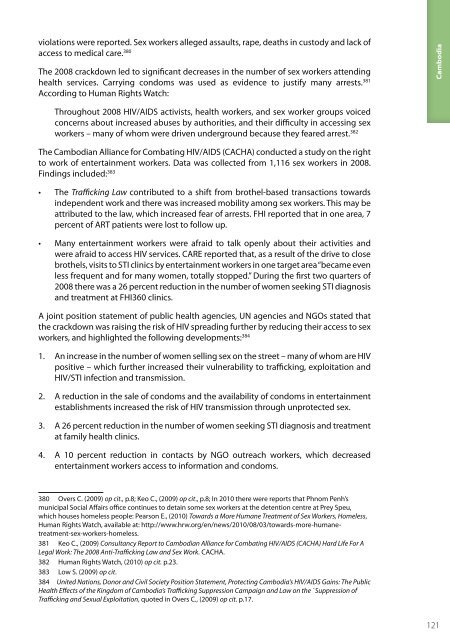SEX WORK AND THE LAW - HIV/AIDS Data Hub
SEX WORK AND THE LAW - HIV/AIDS Data Hub
SEX WORK AND THE LAW - HIV/AIDS Data Hub
Create successful ePaper yourself
Turn your PDF publications into a flip-book with our unique Google optimized e-Paper software.
violations were reported. Sex workers alleged assaults, rape, deaths in custody and lack of<br />
access to medical care. 380<br />
The 2008 crackdown led to significant decreases in the number of sex workers attending<br />
health services. Carrying condoms was used as evidence to justify many arrests. 381<br />
According to Human Rights Watch:<br />
Cambodia<br />
Throughout 2008 <strong>HIV</strong>/<strong>AIDS</strong> activists, health workers, and sex worker groups voiced<br />
concerns about increased abuses by authorities, and their difficulty in accessing sex<br />
workers – many of whom were driven underground because they feared arrest. 382<br />
The Cambodian Alliance for Combating <strong>HIV</strong>/<strong>AIDS</strong> (CACHA) conducted a study on the right<br />
to work of entertainment workers. <strong>Data</strong> was collected from 1,116 sex workers in 2008.<br />
Findings included: 383<br />
<br />
<br />
The Trafficking Law contributed to a shift from brothel-based transactions towards<br />
independent work and there was increased mobility among sex workers. This may be<br />
attributed to the law, which increased fear of arrests. FHI reported that in one area, 7<br />
percent of ART patients were lost to follow up.<br />
Many entertainment workers were afraid to talk openly about their activities and<br />
were afraid to access <strong>HIV</strong> services. CARE reported that, as a result of the drive to close<br />
brothels, visits to STI clinics by entertainment workers in one target area “became even<br />
less frequent and for many women, totally stopped.” During the first two quarters of<br />
2008 there was a 26 percent reduction in the number of women seeking STI diagnosis<br />
and treatment at FHI360 clinics.<br />
A joint position statement of public health agencies, UN agencies and NGOs stated that<br />
the crackdown was raising the risk of <strong>HIV</strong> spreading further by reducing their access to sex<br />
workers, and highlighted the following developments: 384<br />
1. An increase in the number of women selling sex on the street – many of whom are <strong>HIV</strong><br />
positive – which further increased their vulnerability to trafficking, exploitation and<br />
<strong>HIV</strong>/STI infection and transmission.<br />
2. A reduction in the sale of condoms and the availability of condoms in entertainment<br />
establishments increased the risk of <strong>HIV</strong> transmission through unprotected sex.<br />
3. A 26 percent reduction in the number of women seeking STI diagnosis and treatment<br />
at family health clinics.<br />
4. A 10 percent reduction in contacts by NGO outreach workers, which decreased<br />
entertainment workers access to information and condoms.<br />
380 Overs C. (2009) op cit., p.8; Keo C., (2009) op cit., p.8; In 2010 there were reports that Phnom Penh’s<br />
municipal Social Affairs office continues to detain some sex workers at the detention centre at Prey Speu,<br />
which houses homeless people: Pearson E., (2010) Towards a More Humane Treatment of Sex Workers, Homeless,<br />
Human Rights Watch, available at: http://www.hrw.org/en/news/2010/08/03/towards-more-humanetreatment-sex-workers-homeless.<br />
381 Keo C., (2009) Consultancy Report to Cambodian Alliance for Combating <strong>HIV</strong>/<strong>AIDS</strong> (CACHA) Hard Life For A<br />
Legal Work: The 2008 Anti-Trafficking Law and Sex Work. CACHA.<br />
382 Human Rights Watch, (2010) op cit. p.23.<br />
383 Low S. (2009) op cit.<br />
384 United Nations, Donor and Civil Society Position Statement, Protecting Cambodia’s <strong>HIV</strong>/<strong>AIDS</strong> Gains: The Public<br />
Health Effects of the Kingdom of Cambodia’s Trafficking Suppression Campaign and Law on the `Suppression of<br />
Trafficking and Sexual Exploitation, quoted in Overs C., (2009) op cit. p.17.<br />
121
















